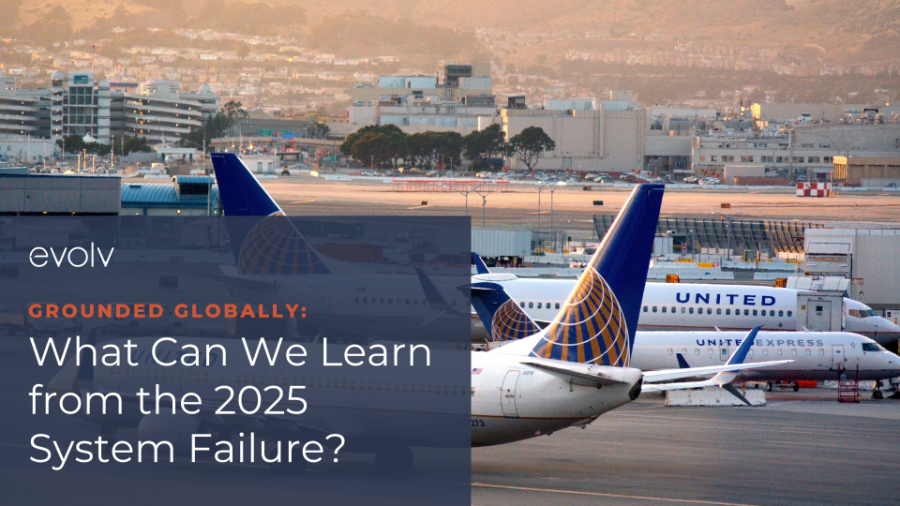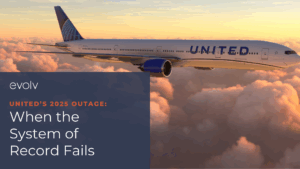But as the saying goes, one should never let a crisis go to waste, and all of us can learn a few lessons from United’s system outage.
1. Know your Dependencies
United’s outage exposed the fragility of interconnected IT ecosystems. The failure originated in a vendor-managed subsystem—believed to handle weight-and-balance data feeds—and United lacked a manual fallback to continue safe dispatch.
Lesson: Conducting regular dependency audits of all critical systems and documenting vendor responsibilities, response SLAs, and escalation paths exposes these risks early. Where possible, build internal, parallel “shadow systems” or manual overrides that allow partial continuity when external platforms fail.
2. Build Real-Time Communication Protocols
Throughout the grounding, passengers and even some crew reported receiving inconsistent updates on what caused the outage and the timeline to resolution. Corporate social channels stayed completely silent for the first hour, while gate agents often learned about the outage from offhand communications on passengers’ phones.
Lesson: Create a tiered communication playbook. Empower frontline employees to deliver accurate, consistent updates supported by dynamic internal dashboards. Corporate communications teams should activate public-facing channels (website banners, X/Twitter, push notifications) within minutes of detection and milestones indicating progress towards issue resolution.
3. Invest in Infrastructure Resilience
It reportedly took nearly three hours to restore United’s systems, a duration suggesting limited to zero hot-failover capability or incomplete real-time mirroring. In industries where downtime can equate to millions in lost revenue and brand equity, resilience isn’t optional—it’s strategic and vital.
United isn’t the only airline to face these problems. On August 8, 2016, Delta suffered a massive data-center power failure in Atlanta, grounding flights worldwide. Over 2,100 flights were canceled across three days, and the financial impact exceeded $150 million. Later investigations showed that while backup generators existed, they failed to activate properly, revealing a single point of failure in the airline’s disaster-recovery design.
A smaller but related outage followed in early 2017, causing 280 flight cancellations when essential IT systems failed again. Analysts concluded that Delta’s resilience gaps stemmed from aging infrastructure and incomplete failover testing—the same vulnerabilities mirrored in United’s 2025 event.
Lesson: Prioritize investments in redundant architecture, cloud failover zones, and automated restoration testing. Run quarterly “chaos drills” that simulate critical system loss to measure true recovery time objectives.
4. Align Compliance with Operational Flexibility
FAA regulations require accurate weight and balance data before any takeoff. When United’s automation failed, no approved manual method existed to generate this data, grounding the fleet until the system came back online.
Lesson: Design compliance workflows that allow controlled manual intervention in emergencies. Regulatory integrity doesn’t need to mean operational paralysis. Pre-approved “manual dispatch” protocols or historical-baseline data sources can keep essential routes moving safely during an outage.
5. Treat Crisis Responses as a Brand Moment
United’s response lagged behind events on the ground. While it later provided compensation and a statement confirming system restoration, its initial silence fueled frustration and widespread social backlash.
Lesson: Crises are defining moments for a brand. Train leadership and customer-facing teams to respond with visible empathy and clarity, not just technical updates. Rapid acknowledgment — even without all answers — signals competence and care.
Final Thoughts
United’s August 2025 grounding wasn’t caused by weather, hackers, or unforeseeable events. It was a preventable failure of systems design, communication, and contingency planning.
For organizations managing complex, high-stakes operations—from airlines to banks to healthcare networks—the takeaway is simple yet urgent: Resilience is built before the crisis, not during it.
United’s outage will fade from the headlines, but for CIOs, COOs, and CISOs, it should remain a permanent case study in operational interdependence and digital risk.
Is your organization prepared? At evolv Consulting, we help organizations identify hidden system vulnerabilities and build resilient, modern architectures that keep operations moving.
Editor’s Note: This article is an opinion piece on lessons that can be learned from a recent systems outage at United Airlines. United Airlines is not a client of evolv Consulting.
Photo credits: Adobe Stock



